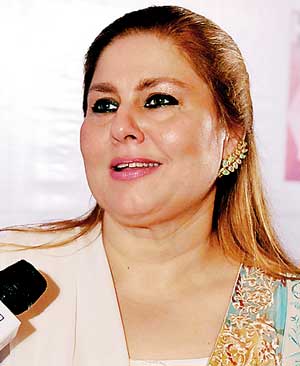Wednesday Feb 25, 2026
Wednesday Feb 25, 2026
Wednesday, 13 January 2016 00:00 - - {{hitsCtrl.values.hits}}
The Trade Development Authority of Pakistan (TDAP) along with High Commission of Pakistan in Sri Lanka will host the Pakistan Single Country Exhibition in Colombo from 15-17 January, with an aim to boost bilateral trade between the two countries. TDAP has prioritised sectors such as textile, pharmaceutical, engineering goods and small and medium enterprises (SMEs) at the exhibition.
Exhibitors from over 110 Pakistani companies will participate in the single country exhibition. Major Pakistan commercial  establishments, among them – Toyota GT Motors, Pak Star Automotive Ltd. and International Industries Ltd. (IIL) will have stalls along with manufacturers of furniture, marble and onyx ware, carpets and kilims as well as apparel and handicrafts. Coinciding with the exhibition will be a Pakistani Food Festival with live presentations by Pakistan’s celebrity Chef Mahboob and his associates.
establishments, among them – Toyota GT Motors, Pak Star Automotive Ltd. and International Industries Ltd. (IIL) will have stalls along with manufacturers of furniture, marble and onyx ware, carpets and kilims as well as apparel and handicrafts. Coinciding with the exhibition will be a Pakistani Food Festival with live presentations by Pakistan’s celebrity Chef Mahboob and his associates.
TDAP Secretary Rabiya Javeri Agha speaking on the forthcoming exhibition said, “We are excited to host the exhibition and hope to showcase the best manufacturing capability of our country.” “This is a joint effort for both countries to establish connections between business communities,” she explained.
She went on to note that imports from Pakistan will be doubled from the existing $ 267 million to $ 500 million this year. Pakistan’s top government body responsible for promoting exports, the TDAP aims to fully utilise the Free Trade Agreement (FTA).
The Free Trade Agreement (FTA) came into effect in 2005. However Pakistan and Sri Lanka were unable to utilise it to its potential. “By effectively using the duty concessions under the Free Trade Agreement, Pakistan can easily double exports to Sri Lanka, in a year’s time,” Javeri went on to note.
Javeri added: “We have given priority to certain sectors as we believe these are the areas where Pakistan has the potential to multiply its exports. Our next target will be to increase exports to $ 1 billion within a few more years.”
The High Commissioner of Pakistan in Sri Lanka Maj. Gen. (R) Syed Shakeel Hussain said, “Pakistan is the second largest trading partner of Sri Lanka in South Asia. Sri Lanka was the first country to sign a Free Trade Agreement with Pakistan, which became operational from 12 June 2005, allowing trade of 4,000 items between the two countries.”
Pakistan Bureau of Statistics data (2014-15) says Pakistan’s exports to Sri Lanka amounted to is $ 267 million as compared to $ 58 million worth imports from Sri Lanka.
Out of the total $ 267 million worth of exports to Sri Lanka in fiscal year 2014-15, $ 89 million or 33% constituted only cotton cloth – a traditional Pakistani export item.
The second and third top exported items to Sri Lanka were cement ($ 37 million) and pharmaceuticals ($ 20 million). Other mentionable products were vegetables, rice, value-added textile, bed wear and other commodities.
Pakistan has only utilised 29% of the FTA concessions so far, therefore, its target is to utilise the FTA first by exporting those products that have huge demand in Sri Lanka.
Replying to a question, Javeri said, “Sri Lanka mainly exports textile products while it imports bed wear, trousers, silk and synthetic textile and other ready-made garments. Pakistan’s exports are slowly growing and it can further increase its share. It is time Pakistan needed to move from traditional cotton cloth to value-added garments to increase its exports. Moreover, the engineering sector has a huge potential among top-25 products that Sri Lanka imports and Pakistan exports.”
TDAP’s single country exhibition is a joint effort for both countries to establish connections between business communities that have been one of the top hindrances in the way of bilateral trade.
Pakistan’s exports to Sri Lanka grew from $ 154 million in 2004 to $ 316 million in 2013, an increase of 105% in nine years. Pakistan only accounted for 1.7% of total Sri Lankan imports from the world in 2013.